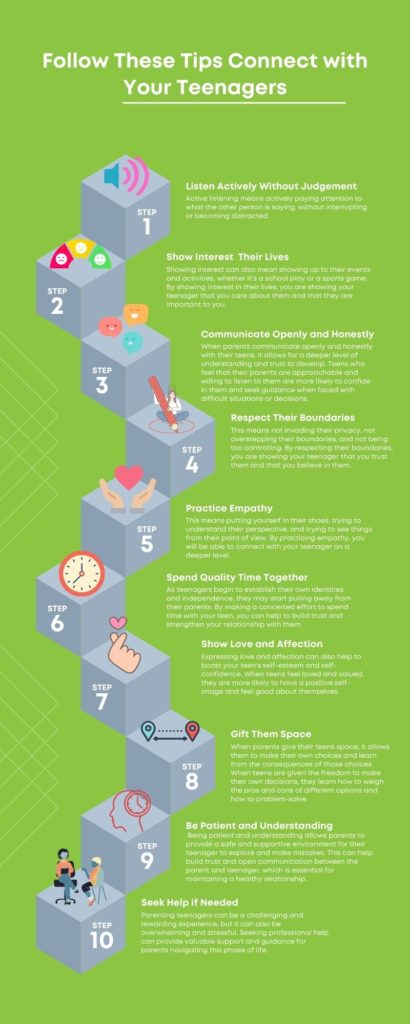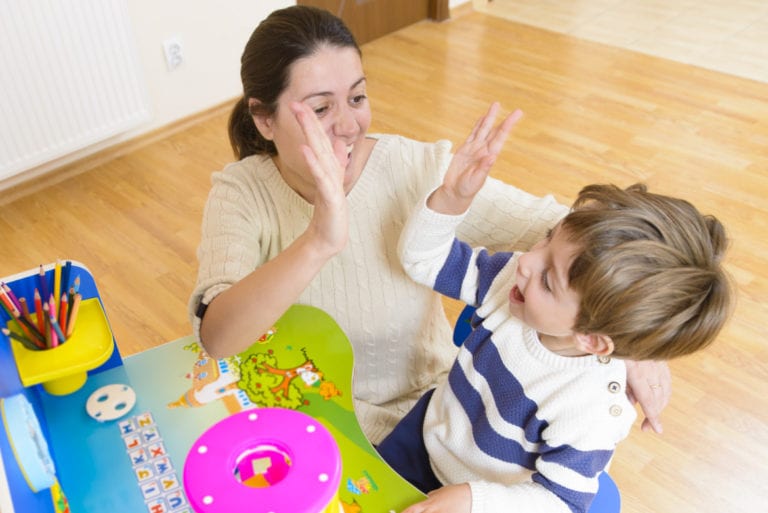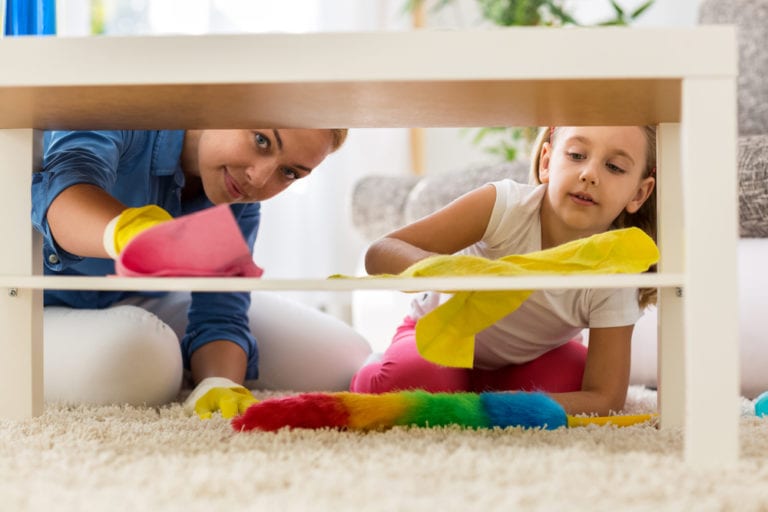The 10 Best Ways to Connect With Your Teen
Disclosure: This post may contain affiliate links, meaning I may get a small commission if you decide to make a purchase through my links, at no cost to you.

Connecting with your teenager can be difficult, especially when they treat you like you are the dumbest person they know at the moment. Then there is the occasional eye roll and door slamming that makes you feel like you are miles apart.
But connecting the right way will help you gain and maintain a healthy and strong relationship with them. Consider looking into Democratic Parenting to raise emotionally strong and independent teens and children.
Adolescence is a time of great change and growth, and it can be challenging for parents to understand and connect with their teens. However, by making a concerted effort to understand their perspective and create opportunities for communication, you can build a strong connection with your teenagers. Let’s explore the top 10 best ways to connect with your teen. For more help check out our Start Here page for finding help with Communication, Connection and Cooperation.
1. Ways to connect to your teen – Listen actively and without judgment
One of the most important things you can do to connect with your teenager is to actively listen to them. This means putting away distractions, making eye contact, and truly hearing what they have to say without judgment. Your teenager may have a lot to say, and they may not always feel heard, so actively listening to them will show them that you care and are interested in what they have to say.

Active listening is an important skill for parents to have when communicating with their teens. It means actively paying attention to what the other person is saying, without interrupting or becoming distracted. This can be difficult, especially when dealing with a teenager who may be going through a difficult time or expressing strong emotions. However, active listening can help parents understand their teen’s perspective and build trust in the relationship.
When parents listen actively and without judgment, teens are more likely to open up to them about their thoughts and feelings. This can help parents understand their teens better and provide the support they need. It also helps teens to feel heard and validated, which can help them to process their emotions and make sense of their experiences. Additionally, active listening can help parents to identify when their teen may be struggling with mental health issues or other problems and provide the appropriate support.
Active listening also helps parents to avoid misunderstandings and conflicts with their teens. When parents are not actively listening, they may misinterpret what their teens are saying or respond in a way that is not helpful. This can lead to frustration and resentment on both sides. By listening actively and without judgment, parents can understand their teens’ perspectives and respond in a way that is supportive and respectful. This can help to build a stronger, healthier relationship with their teens, which will be beneficial for everyone involved.
2. Ways to connect with your teen – Show interest in their lives
Another important way to connect with your teenager is to show interest in their lives. This means asking about their day, their hobbies, and their friends.

You may get some pushback when asking about how school went or any question really. They may respond with, “I don’t want to talk about it.” Then just assure them that you care about them. Showing interest can also mean showing up to their events and activities, whether it’s a school play or a sports game. By showing interest in their lives, you are showing your teenager that you care about them and that they are important to you.
It is important for parents to show interest in their teens’ lives because it helps to build trust and communication between them. When teens feel that their parents are interested in and care about their lives, they are more likely to confide in and seek guidance from them. Additionally, when parents are aware of and involved in their teens’ activities and interests, they can better understand and support their teens’ development and provide appropriate guidance and boundaries.
Dr Frances Jensen from the book The Teenage Brain said that the teenage brain is not as resilient to drugs as we once thought. When we show a genuine interest in our kids, we show them that they can come to us for anything and then they are less likely to turn to drugs and alcohol.
3. Ways to connect with your teen – Communicate openly and honestly
Open and honest communication is key to connecting with your teenager. This means being honest with them about your thoughts and feelings and encouraging them to do the same. It also means being open to discussing difficult subjects such as sex, drugs, and alcohol. When teens decide to open up, it is important not to overreact. The last thing they want is a lecture. By communicating openly and honestly, you will build trust and respect with your teenager, which is essential for a strong connection.

Related: How to Talk To Your Kids So They Will Really Listen.
Effective communication between parents and teens is crucial for maintaining a healthy and positive relationship. When parents communicate openly and honestly with their teens, it allows for a deeper level of understanding and trust to develop. Teens who feel that their parents are approachable and willing to listen to them are more likely to confide in them and seek guidance when faced with difficult situations or decisions.
Open and honest communication also allows parents to be more involved in their teen’s life and to provide guidance and support that is tailored to their unique needs and circumstances. This can help teens navigate the challenges and pressures of adolescence, such as peer pressure and academic stress, in a healthy and positive way. Furthermore, when parents communicate openly with their teens, it helps teens to develop their own communication skills, which will be beneficial for them in the long run.
Open and honest communication between parents and teens can also help to prevent or address potential problems, such as substance abuse or mental health issues. When parents are aware of their teen’s thoughts, feelings and behaviors, they are better equipped to provide support, guidance and referrals for professional help if necessary. This can help to ensure that teens have the resources and support they need to lead happy, healthy and successful lives.
Always offer words of encouragement to your teens instead of praise.
Related: Words of Encouragement Vs Praise
4. Ways to connect with your teen – Respect their boundaries
Teenagers are starting to establish their own sense of self and independence, so it’s important to respect their boundaries. This means not invading their privacy, not overstepping their boundaries, and not being too controlling. By respecting their boundaries, you are showing your teenager that you trust them and that you believe in them.

It is important for parents to respect their teens’ boundaries because it helps to foster a sense of trust and open communication within the family. When teens feel that their boundaries are being respected, they are more likely to feel comfortable sharing their thoughts and feelings with their parents. This can lead to deeper understanding and stronger relationships between parents and teens.
Another reason why it is important for parents to respect their teens’ boundaries is that it helps to promote independence and self-sufficiency in teens. As teens grow and develop, they need to learn how to make their own decisions and take responsibility for their actions. When parents respect their teens’ boundaries, they are allowing their teens to practice and develop these important life skills.
Respecting teens’ boundaries is important for their emotional and mental well-being. Teens who feel that their boundaries are being respected are more likely to have healthy self-esteem and a sense of control over their lives. This can lead to a greater sense of happiness and fulfillment, and can also help to prevent the development of mental health issues such as anxiety and depression.
Related: 5 Difficult Hurdles to Raising Great Adults.
5. Ways to connect with your teen – Practice empathy
Empathy is the ability to understand and share the feelings of another person. To connect with your teenager, it’s important to practice empathy. This means putting yourself in their shoes, trying to understand their perspective, and trying to see things from their point of view. By practicing empathy, you will be able to connect with your teenager on a deeper level.

Practicing empathy with teens is important for a number of reasons. First and foremost, it allows parents to understand and relate to their children on a deeper level. Adolescence can be a difficult time for both teens and parents, as teens are navigating new social dynamics, emotions, and physical changes. By practicing empathy, parents can better understand what their child is going through and be there to support them through these challenges.
Practicing empathy can help to build trust and open communication between parents and teens. Teens are more likely to share their thoughts and feelings with their parents if they feel that their parents truly understand and care about what they are going through. This open communication can also help to prevent teens from turning to their peers for support and guidance, which can be risky given the potential for peer pressure and negative influences.
Practicing empathy can help parents to set appropriate boundaries and discipline their teens. When parents understand and empathize with their teens, they are better equipped to set boundaries that are fair and reasonable, rather than arbitrary and punitive. Additionally, when parents practice empathy, they are more likely to see the underlying reasons for their teens’ behavior, which can help them to address the root causes rather than simply punishing the behavior itself.
6. Ways to connect with your teen – Spend quality time together
Spending time with your teenager is one of the most important things you can do as a parent. During the teenage years, children are going through a period of rapid physical, emotional, and mental growth and they need the support and guidance of their parents more than ever. Here are a few reasons why it is so important to spend time with your teen.

Spending time with your teen helps to strengthen your relationship with them. As teenagers begin to establish their own identities and independence, it can be easy for them to start pulling away from their parents. By making a concerted effort to spend time with your teen, you can help to build trust and strengthen your relationship with them. This, in turn, will make it easier for them to come to you with problems or concerns as they navigate the challenges of adolescence.
Spending time with your teen also gives you an opportunity to understand their perspective. The teenage years can be a time of great confusion and uncertainty, and it can be difficult for parents to understand what their child is going through. By spending time with your teen, you can gain insight into their thoughts, feelings, and experiences, which will help you to understand their perspective and support them in a more effective way.
Spending time with your teen can also help to prevent risky behaviors. Adolescence is a time when teens are particularly susceptible to peer pressure and the influence of their peers. By spending time with your teen and building a strong relationship with them, you can provide them with a sense of security and belonging that will help them to resist negative influences and make healthier choices.
Spending time with your teen also allows you to teach them important life skills. As your teenager grows older, they will need to learn how to manage money, cook, clean, do laundry, and other skills that will help them to be independent adults. By spending time with them, you can teach them these skills and help them to develop the confidence and self-sufficiency that they will need to succeed in the world.
Spending time with your teen can also be a lot of fun! Who doesn’t love to have fun? As a parent, it can be easy to get caught up in the day-to-day demands of parenting and forget to enjoy time with your child. By spending time with your teenager, you can create fun and memorable experiences that you will both treasure.
Activities You Can Do With Your Teens
- Take a trip or go on a vacation together.
- Go out to eat at a restaurant or cook a meal together at home.
- Play sports or go for a hike or bike ride together.
- Attend a concert, play, or sporting event together.
- Volunteer together at a local charity or non-profit organization.
- Plan and execute a DIY project or home improvement project together.
- Play a board game or video game together.
- Take a class or workshop together, such as cooking, art, or photography.
- Go shopping together, whether it’s for clothes or other items.
- Read a book or watch a movie together, and discuss it afterward.
- Visit a museum or art gallery together.
- Take a day trip to a nearby city or attraction.
- Have a spa day or a pampering day together.
- Go bowling, mini golfing, or to an amusement park together.
- Take a dance or fitness class together.
- Have a game night with friends or family.
- Go camping or have a picnic in nature.
- Plan and have a themed party together.
- Have a family photo shoot.
- Try a new hobby together such as pottery or knitting.
It’s important to remember that the activity itself is not as important as the time spent together and the connection that is built. The key is to find activities that you both enjoy and that will allow you to bond and have fun together.
Related: 47 Super Fun Family Game Night Ideas
Benefits of Family Fun Night – Plus Family Fun Nigh Ideas!
7. Ways to connect with your teen – Show love and affection
Showing love and affection to your teens is important for a variety of reasons. For one, it helps to build and maintain a strong emotional bond between parent and child. This can be especially important during the teenage years, as teens are going through a lot of physical, emotional, and social changes.

Expressing love and affection can also help to boost your teen’s self-esteem and self-confidence. When teens feel loved and valued, they are more likely to have a positive self-image and feel good about themselves. This can have a positive impact on their academic and social lives, as well as their overall well-being.
Additionally, showing love and affection can help to promote open communication between parent and child. When teens feel loved and supported, they are more likely to share their thoughts, feelings, and concerns with their parents. This can be especially important during the teenage years, as teens may be dealing with a lot of complex and difficult issues.
Showing love and affection can also help to prevent problem behaviors in teens. When teens feel loved and supported, they are less likely to engage in risky behaviors such as substance abuse or early sexual activity. Studies have shown that teens who have a strong emotional bond with their parents are more likely to make healthy choices and avoid negative behaviors.
Showing love and affection to your teens also helps to foster independence. When teens feel loved and supported, they are more likely to take risks and try new things. This can be especially important during the teenage years, as teens are learning to navigate the world on their own and develop their own identities.
8. Ways to connect with your teen – Give them space
As children grow into teenagers, they begin to develop their own sense of self and independence. It is important for parents to recognize and support this process by giving their teens space. Giving teens space allows them to make their own choices, learn from their mistakes, and develop important life skills.

One of the main reasons why it is important for parents to give their teens space is that it allows them to make their own choices and learn from the consequences of those choices. When teens are given the freedom to make their own decisions, they learn how to weigh the pros and cons of different options and how to problem-solve. This helps them develop critical thinking skills that will serve them well in the future. Additionally, when teens are allowed to make their own choices, they are also given the opportunity to learn from their mistakes. This can be a valuable lesson that they will carry with them throughout their lives.
Another reason why it is important for parents to give their teens space is that it allows them to develop their own sense of self and independence. Teens need to learn how to make decisions for themselves, set and achieve goals, and take responsibility for their actions. When parents give their teens space, they are giving them the opportunity to develop these skills and become more self-sufficient.
Giving teens space also allows them to form their own relationships and social networks. Teens need to learn how to interact with people outside of their family, and how to build and maintain relationships. This is an important part of growing up and becoming a well-adjusted adult.
It is important for parents to remember that giving teens space does not mean neglecting them or not being involved in their lives. Parents should still be involved in their teens’ lives and provide guidance and support when needed. However, it is important to give teens the freedom to make their own decisions and learn from the consequences of those decisions.
9. Ways to connect with your teen – Be patient and understanding.
Connecting with your teenager can be difficult at times, and it’s important to be patient and understanding. Remember that they are going through a lot of changes and that it takes time to build a strong connection.

Teenagers are going through a critical period of development where they are trying to establish their own identities and independence. Being patient and understanding allows parents to provide a safe and supportive environment for their teenager to explore and make mistakes. This can help build trust and open communication between the parent and teenager, which is essential for maintaining a healthy relationship.
Adolescents often struggle with emotions and may not have the same level of emotional regulation as adults. Being patient and understanding can help parents respond appropriately to their teenager’s emotional outbursts, rather than becoming frustrated or angry themselves. This can prevent further escalation of the situation and help their teenager learn how to manage their emotions in a healthy way. When you lose your patience or want to teach patience in your home consider learning about the THINK method.
Teenagers are exposed to many new and complex experiences, such as peer pressure, dating, and academic pressure. Being patient and understanding allows parents to listen to their teenager’s concerns and provide guidance without judgment. This can help the teenager feel heard and understood and increase their likelihood of seeking help and guidance from their parents in the future. Ultimately, being patient and understanding with teenagers can help parents maintain a positive and healthy relationship with their teenagers and support them through the challenging transition to adulthood.
Related: 12 Super Subjective Rules for Raising Teens
10. Ways to connect with your teen – Seek help if needed.
If you are struggling to connect with your teenager, don’t be afraid to seek help.

Parenting teenagers can be a challenging and rewarding experience, but it can also be overwhelming and stressful. Seeking professional help can provide valuable support and guidance for parents navigating this phase of life.
Seeking professional help can provide a neutral perspective on the challenges and conflicts that may arise between parents and their teenage children. A therapist can provide insight and guidance on how to communicate effectively and navigate difficult conversations.
Professional help can also address any underlying emotional or mental health issues that may be affecting the parent or teenager. Both parents and teenagers may benefit from therapy to address anxiety, depression, or other mental health concerns.
Professional help can also provide support for parents who are struggling with their own emotional well-being. Being a parent can be stressful and overwhelming, and seeking therapy can provide a space for parents to process and cope with their own emotions. It can also be a valuable resource for parents who may be experiencing feelings of guilt, shame, or inadequacy in their role as a parent.
Connecting with your teenager can be a challenging task, but it is an essential one. Building a strong relationship with your teenager is important for their mental and emotional well-being. Showing interest in their hobbies and interests, listening actively, and communicating openly and honestly are some of the best ways to connect with your teenager. Setting boundaries and consequences, spending quality time together, showing love and affection, being a good role model, being patient and understanding and seeking help when needed are also important ways of connecting with your teenager. It’s important to remember that building a strong connection with your teenager takes time and effort, but it will be worth it in the end.

GET FREE ACCESS TO OUR LIBRARY OF FREE PRINTABLES AND RESOURCES!
Enter Your Name and Email for FREE Access to our Library of FREE Home and Family Printables Series!





